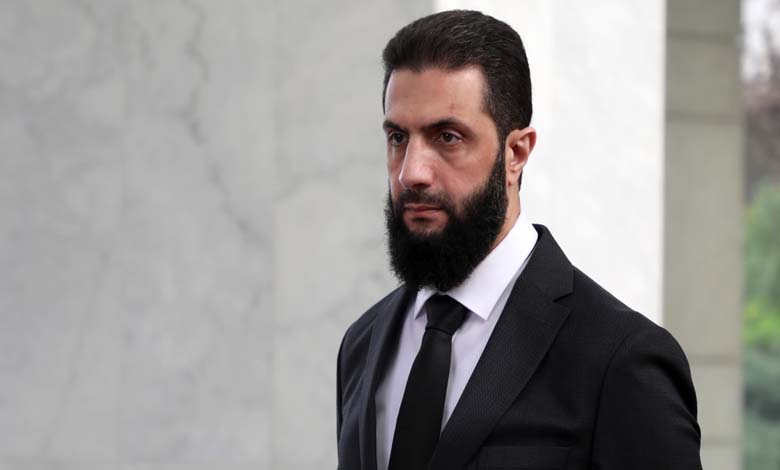Did Al-Sharaa Demand U.S. Protection to Attend the Arab Summit in Baghdad?

An Iraqi government source confirms that Syrian interim president Ahmed al-Sharaa requested additional security guarantees from both Iraqi authorities and the American side—most notably, protection by a U.S. private security firm—amid threats from militias and groups linked to Tehran.
As the Arab Summit in Baghdad scheduled for May 17 approaches, serious doubts remain over the participation of interim Syrian President Ahmed al-Sharaa, due to rising security concerns voiced in recent days. Observers describe the situation as a “sensitive security environment” dominated by pro-Tehran militias, some of which have openly opposed al-Sharaa’s presence in the Iraqi capital.
-
Syrian Coast Events: Commitment to “Accountability” and Arrest of Suspects
-
Syrian Kurds Plan to Empty Jihadist Camps by the End of the Year
A senior Iraqi official told the Kurdish-Iraqi outlet “Shafaq News” on Monday that al-Sharaa requested exceptional security guarantees, including protection by an American security company. The move was widely interpreted as a sign of distrust toward official entities managing security in Baghdad, which al-Sharaa believes are under direct Iranian influence.
Although the Iraqi government issued an official invitation to al-Sharaa—marking a significant step toward rapprochement between Baghdad and Damascus after years of severed ties—the invitation sparked intense debate within Iraq’s political circles, particularly among pro-Iranian factions. Some recalled al-Sharaa’s past when he was known as “Abu Mohammad al-Julani,” a jihadist active in Iraq during the height of al-Qaeda’s presence in Iraqi cities.
-
Al-Sharaa Pledges to Form an Inclusive Government in His First Speech to Syrians
-
Security Chaos Returns to Syrian Regions… Hayat Tahrir al-Cham Members Top the List of Accused
Legal questions arose about the possibility of prosecuting him, but Iraqi legal experts confirmed that his current status as head of state grants him full diplomatic immunity under international law, nullifying any past arrest warrants.
According to sources close to the Syrian presidency, what worries Damascus is not just al-Sharaa’s legal history in Iraq, but primarily the veiled threats from pro-Iranian armed groups, which labeled his presence as an “unacceptable provocation.” Others, like the Coordination Framework, maintained ambiguity by describing the invitation as “a protocol gesture,” without offering clear support or explicit rejection.
-
Washington Navigates the Syrian “Minefield”
-
Libyan Muslim Brotherhood Member Incites Armed Resistance Inspired by Syrian Factions
This ambiguity led al-Sharaa to believe that Iran’s position on his visit remains uncertain, particularly due to Tehran’s conspicuous silence. While Iran hasn’t explicitly rejected the invitation, it also hasn’t issued any assurances to ease Syrian concerns about the delegation’s safety.
A senior Syrian source said, “al-Sharaa does not trust that the Iraqi government, despite its good intentions, can secure the summit, especially as several critical security institutions remain under the direct or indirect control of Iran-aligned factions.”
-
Armed factions have become a key player in the Syrian landscape – Details
-
“Al-Joulani’s Plans”: Abolishing Mandatory Military Service and Undermining Syrian Kurds
Al-Sharaa’s request for American protection via a private security firm reflects Syria’s deep anxiety about Baghdad’s security climate. The request carries a dual political message: first, a lack of trust in Iraqi guarantees; second, a desire to neutralize any groups that might see his presence as a threat or provocation.
The request also comes amid active Qatari mediation between Damascus and Baghdad. A previous meeting between al-Sharaa and Iraqi Prime Minister Mohammed Shia al-Sudani in Doha helped pave the way for the official invitation. However, while Doha supports the visit, it lacks the operational capacity to guarantee al-Sharaa’s security on Iraqi soil, further complicating matters.
-
Landmines and Unexploded Ordnance: Obstacles to Syrians Returning Home
-
Aleppo Clashes: Syrian Army “Cleanses” Several Areas and Prepares for a Counterattack
Although the Coordination Framework—an influential Iran-backed coalition—has not officially opposed al-Sharaa’s attendance, recent statements by its leaders, including Ammar al-Hakim and Hadi al-Amiri, framed the invitation as “purely protocol,” sidestepping any explicit endorsement that might upset Tehran.
More alarmingly, some militia leaders issued veiled threats warning against “using the summit to whitewash figures responsible for Iraqi bloodshed”—a message that al-Sharaa’s allies interpret as indirect threats aimed at him personally.
-
Meager Salaries and Stark Discrimination: Why Are Syrians Defecting from Iranian Militias?
-
Betrayal and Corruption Plague Syrian Opposition Army
The announcement of the invitation also triggered an unprecedented media backlash, with Iraqi outlets and social media campaigns attacking what they described as the government’s attempt to “legitimize former jihadists at regional summits.” This reflects the deep internal divisions within Iraq over how to engage with Damascus and the new Syrian leadership.
Should the visit proceed, it would be a pivotal moment in Syria’s path toward normalizing ties with Arab capitals. Al-Sharaa seeks to prove that Syria, under his leadership, is rejoining the Arab fold after years of international isolation. However, the serious security threats and strong opposition from powerful factions make his participation fraught with risks—including real fears of assassination or targeted attacks.
-
SDF Fights Syrian Army, Calls on Coalition to Combat ISIS
-
Closing the Syrian-Iraqi Borders: What Is Iran Aiming for?
-
The Syrian Democratic Forces Imposes Curfew in Deir ez-Zor as Battles Escalate with Tribes












